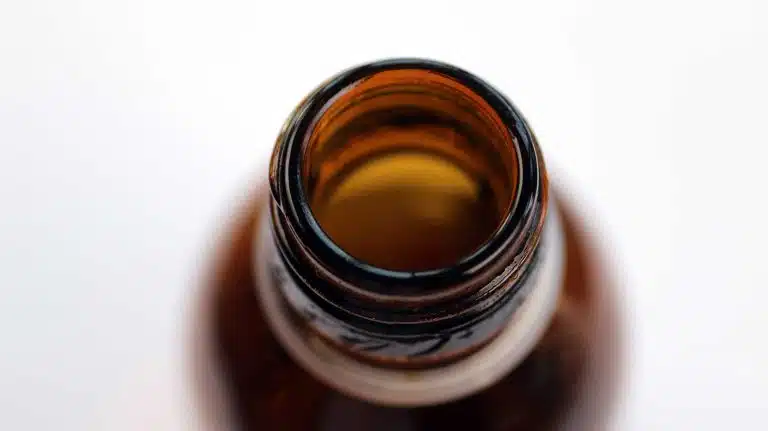Mixing Codeine & Alcohol | Effects & Dangers
- How Do People Mix Codeine & Alcohol?
- Effects Of Mixing Codeine & Alcohol
- Dangers Of Mixing Codeine & Alcohol

Codeine is a prescription opioid that treats mild to moderate pain. It’s also a cough suppressant that appears in various cough syrups.
If you drink alcohol while taking codeine or codeine cough syrup, you face serious health risks.
How Do People Mix Codeine & Alcohol?
Some people drink alcohol right before or right after taking codeine in pill form.
Other people, especially teenagers and young adults, use codeine cough syrup and alcohol to make a drink known as “lean,” “purple drank,” or “sizzurp.” The drink may also contain soda and hard candy.
Effects Of Mixing Codeine & Alcohol
Both codeine and alcohol are central nervous system (CNS) depressants. That means they slow down CNS functions such as brain activity, heart rate, breathing, and body temperature.
Because they act similarly, codeine and alcohol boost each other’s effects. Thus, many people drink alcohol to intensify the pleasant effects of codeine, which include pain relief, relaxation, and euphoria (intense joy).
Unfortunately, codeine and alcohol also boost each other’s negative effects. These effects include:
- drowsiness
- lightheadedness
- nausea and vomiting
- constipation
- slurred speech
- blurry vision
- loss of motor control
- cognitive impairments, such as confusion, memory loss, and poor judgment
Dangers Of Mixing Codeine & Alcohol
Along with unpleasant side effects, alcohol and codeine can cause severe health problems, especially with regular use. These problems may include:
Respiratory Depression
Since both codeine and alcohol affect your breathing, mixing the drugs can lead to respiratory depression. This condition causes slow, ineffective breathing. Other symptoms can include:
- sleepiness
- shortness of breath
- depression
If the condition goes untreated, you may experience additional symptoms, such as confusion, headaches, seizures, and respiratory arrest. Respiratory arrest occurs when your breathing stops. It often leads to brain damage or death.
Liver Damage
Some medications that contain codeine also contain acetaminophen (brand name Tylenol). This substance can increase your risk of liver damage, especially if you use it in large amounts or mix it with other substances that cause liver damage, including alcohol.
Common signs of liver damage may include:
- extreme drowsiness
- loss of appetite
- nausea and vomiting
- stomach pain and swelling
- yellowing of the eyes or skin (jaundice)
When left untreated, liver damage may lead to liver failure, which can be fatal.
Life-Threatening Injuries
Codeine and alcohol impair your judgment. With poor judgment, you face a higher risk of injuries like burns, falls, and drownings. In some cases, these injuries are life-threatening.
Poor judgment also makes you more likely to drive while intoxicated or ride in a vehicle with someone who’s intoxicated. This behavior significantly increases your risk of a motor vehicle crash, which can cause fatal injuries.
Substance Use Disorder
Both codeine and alcohol cause a temporary boost in mood. Once the drugs wear off, though, you may feel even worse than you did before.
You may then start relying on codeine and alcohol use to feel happy, which can lead to substance use disorder (also called drug addiction). This disease makes you feel unable to control your drug use.
The most common signs of substance use disorder are tolerance and physical dependence. Tolerance means you need increasingly larger or more frequent amounts of a drug to feel the desired effects.
Physical dependence means your body relies on a drug to function normally. If you stop using it, you may experience unpleasant withdrawal symptoms like shaking, sweating, and trouble sleeping.
Other signs of substance use disorder include:
- intense cravings for drugs
- mood swings
- lack of motivation
- avoidance of friends and family
- loss of interest in activities once enjoyed
- decline in personal hygiene
Substance use disorder may require professional treatment at a drug abuse treatment program.
Overdose
Both codeine and alcohol are central nervous system (CNS) depressants, which means they slow down your central nervous system. When you mix two CNS depressants, your central nervous system may slow down to the point of overdose.
Moreover, alcohol can cause codeine to enter your body more rapidly than normal. This effect further increases the risk of overdose.
Common signs of overdose include:
- confusion
- nausea and vomiting
- slow breathing
- slow heart rate
- pale, clammy, or bluish skin
- seizures
- loss of consciousness
If you or someone you know experiences these symptoms seek medical care right away. When left untreated, an overdose may be life-threatening.
To learn about treatment options for codeine and alcohol abuse, please contact an Ark Behavioral Health specialist. Our substance abuse and addiction treatment centers offer medical detox, mental health counseling, and other recovery-focused services.
Written by Ark Behavioral Health Editorial Team
©2024 Ark National Holdings, LLC. | All Rights Reserved.
This page does not provide medical advice.
Centers for Disease Control and Prevention - Drinking too much alcohol can harm your health
National Institute on Alcohol Abuse and Alcoholism - Harmful Interactions
National Institute on Alcohol Abuse and Alcoholism - Understanding the Dangers of Alcohol Overdose
United States National Library of Medicine - Codeine

Questions About Treatment?
Ark Behavioral Health offers 100% confidential substance abuse assessment and treatment placement tailored to your individual needs. Achieve long-term recovery.
100% confidential. We respect your privacy.
Prefer Texting?
Our friendly support team is here to chat 24/7. Opt out any time.







 Learn More
Learn More








